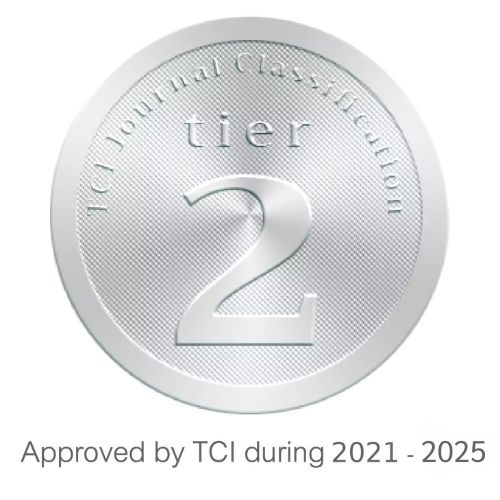การพัฒนาสมรรถนะการจัดการด้วยรูปแบบวิธีสำ รวจประเมิน สภาพการณ์และสำ รวจเชิงพรรณาแนวคิดเพิ่มพูน กรณีศึกษาโรงแรมคอนราดกรุงเทพ
Using Evaluative and Generative Approach to Improve Management Competency: A Case of Conrad Bangkok Hotel
Keywords:
ความสามารถในการจัดการ, การสื่อสาร, แรงจูงใจ, การทําางานเป็นทีม, ความน่าเชื่อถือ, การตัดสินใจ, วิธีการประเมิน, สถานการณ์, วิธีการปริวรรตเพิ่มพูนAbstract
การศึกษาครั้งนี้มีวัตถุประสงค์เพื่อหาวิธีปรับปรุงความสามารถในการจัดการของผู้นำ การศึกษา เริ่มต้นจากการตรวจสอบและประเมินระดับความสามารถในการจัดการของผู้นำ จากนั้นสร้างวิธี แก้ปัญหาโดยใช้การฝึกอบรมเชิงปฏิบัติการผ่านการแบบสุนทรียปรัศนีย์ในสอบถามเรื่องปัญหา และ หาวิธีการแก้ปัญหาเพื่อปรับปรุงศักยภาพของความสามารถในการจัดการของผู้นำ ผู้ให้ข้อมูลคือผู้นำ ในแผนกและพนักงานของโรงแรมคอนราดกรุงเทพซึ่งทำ งานในแผนกปฏิบัติการในสามแผนก ได้แก่ แผนกอาหารและเครื่องดื่ม แผนกต้อนรับส่วนหน้า และแผนกแม่บ้าน การวิจัยนี้ประกอบด้วยสี่ขั้นตอน คือ การวิเคราห์สถานะการณ์เบื้องต้นเพื่อประเมินผลก่อนการฝึกอบรมเชิงปฏิบัติการแบบสุนทรีย ปรัศนีย์ การเก็บข้อมูลจากแบบสอบถาม การออกแบบและการนำ เสนอการฝึกอบรมเชิงปฏิบัติการ แบบสุนทรียปรัศนีย์และ การประเมินผลหลังการฝึกอบรมเชิงปฏิบัติการแบบสุนทรียปรัศนีย์ แบบ สอบถามเชิงโครงสร้างเป็นเครื่องมือที่ใช้ในวิจัยนี้เพื่อใช้ในการตรวจสอบระดับความสามารถในการ จัดการของผู้นำ จากมุมมองของผู้นำ เองและจากพนักงาน ผลการศึกษาพบว่า สามเดือนหลังจากการ ฝึกอบรมเชิงปฏิบัติการแบบสุนทรียปรัศนีย์มีประสิทธิภาพกับการแก้ปัญหาและปรับปรุงศักยภาพของ ความสามารถในการจัดการของผู้นำ ในสามแผนกนี้ในโรงแรมคอนราดกรุงเทพReferences
Barge, J.K. (2004). Reflexivity and Managerial Practice. Communication Monographs, 71(1): 72-98.
Bennis, W. & Nanus, B. (2003). Leaders: The Strategies for Taking Change. New York, NY: Harper and Row.
Chathoth, P.K; Mak, B. & Manaktola, V.J.K. (2007). Employees’ Perceptions of Organizational Trust and Service Climate: A Structural Model Combining Their Effects on Employee Satisfaction. Journal of Hospitality & Tourism Research,31(3): 338-357.
Chen, P. & Choi, Y. (2008). Generational Differences in Work Values: A Study of HospitalityManagement. International Journal of Contemporary Hospitality Management,20(6): 595-615.
Chung-Herrera, B.G; Enz, C.A. & Lankau, M.J. (2003). Grooming Future Hospitality Leaders:A Competencies Model. Cornell Hotel and Restaurant Administration Quarterly, 44(3): 17-25.
Cooperrider, D.L; Whitney, D. & Stavros, J.M. (2008), Appreciative Inquiry Handbook: For Leaders of Change. 2nd ed. Brunswick, OH: Crown Custom publishing, Inc.
Cummings, T.G. & Worley, C.G. (2014). Organization Development and Change.Boston, MA.: Cengage learning.
De Vries, R.E; Bakker-Pieper, A. & Oostenveld, W. (2010). The Relations of Leaders’Communication Styles with Leadership Styles, Knowledge Sharing and Leadership Outcomes. Journal of Business and Psychology, 25(3): 367-380.
Dı ́as-Sa ́enz, H. (2011). Transformational leadership. In: Bryman, A., Collinson, D., Grint, K., Jackson, B. & Uhl-Bien, M. (eds), The Sage Handbook of Leadership, pp. 299-309.
Thousand Oaks, CA: Sage Publications, Evans, J. & Lindsay, W. (2007). The Management and Control of Quality. Singapore: Thomson South-Western.
Georgellis, Y; Iossa, E & Tabvuma, V. (2011). Crowding out Intrinsic Motivation in the Public Sector. Journal of Public Administration Research and Theory, 21(3): 473–493.
Gibbons, J. (2006). Employee Engagement: A Review of Current Research and Its Implications. Retrieved on August 15, 2020, from http://www.conference-board.org.
Hair, J. F; Black, W. C; Babin, B. J; Anderson, R. E. & Tatham, R. (2006). Multivariate Data Analysis. Upper Saddle River, New Jersey: Pearson Saddle River.
Hendricks, M. L. & Testa, R. J. (2012). A Conceptual Framework for Clinical Work with Transgender and Gender Nonconforming Clients: An Adaptation of the Minority Stress Model. Professional Psychology, Research and Practice, 43(5): 460-467.
Katz, R.L. (1974). Skills of An Effective Administrator. Harvard Business Review, 52(5): 90-102.
Krejcie, R.V. & Morgan, D.W. (1970). Determining Sample Size for Research Activities. Educational and Psychological Measurement, 30: 607-610.
Testa, M. R. & Sipe, L. (2012). Service-Leadership Competencies for Hospitality and Tourism Management. International Journal of Hospitality Management, 31: 648–658.
Makrinova, Elena & Grigorieva, Viktoriya. (2015). Motivation Mechanism of Work Behaviour Enhancement of Hospitality Industry Employees. Journal of Advanced Research in Management, 6(2): 146-156.
Manzoor, S; Ullah, H; Hussain, M. & Ahmad, Z. (2011), Effect of Teamwork on Employee Performance, International Journal of Learning and Development, 1(1): 110-126.
McClelland, David C. (1973). Testing for Competence Rather than for Intelligence. American Psychologist, 28(1): 1-14.
Robinsons, D; Perryman, S & Hayday, S. (2004). The Driver of Employment Engagement. Brighton: Institute for Employment Studies.
Robbin dan Judge. (2007). Perilaku Organisasi: Buku 1 dan 2. Jakarta: Salemba Empat.
Russell, R.F. & Stone, A.G. (2002). A Review of Servant Leadership Attributes: Developing a Practical Model. Leadership & Organization Development Journal, 23(3): 145-157.
Schermerhorn, J. R; Hunt, J. G. & Osborn, R. N. (2011). Organizational Behavior. 11thed. New York, NY: Wiley.Spinelli, M.A. & Canavos, G.C. (2000), Investigating the Relationship between Employee Satisfaction and Guest Satisfaction. Cornell Hotel and Restaurant Administration Quarterly, 41(6): 29-33.
Srivastava, S. (2013). Job Satisfaction and Organizational Commitment Relationship: Effect of Personality Variables. The Journal of Business Perspective, 17(2): 156-167.
Steers, R.M; Nardon, L & Sanchez-Runde, C. (2013). Management Across Cultures: Developing Global Competencies. 2nd ed. New York, NY: Cambridge University Press.
Tan, G. (1998). Managing Creativity in Organizations: A Total System Approach. Creativity and Innovation Management, 7(1): 23–31.
Uzonna, U.R. (2013). Impact of Motivation on Employees’ Performance: A Case Study of Credit West Bank Cyprus. Journal of Economics and International Finance,5: 199-211.
Valentini Kalargyrou, Robert H. Woods. (2011). Wanted: Training Competencies for the Twenty‐First Century. International Journal of Contemporary Hospitality Management, 23(3): 361-376.
Van Dierendonck, D; Stam, D; Boersma, P; de Windt, N & Alkema, J. (2014). Same Difference? Exploring the Differential Mechanisms Linking Servant Leadership and Transformational Leadership to Follower Outcomes. The Leadership Quarterly, 25(3): 544-562.
Walters, G. and Raybould, M. (2007). Burnout and Perceived Organisational Support among Front-Line Hospitality Employees. Journal of Hospitality and Tourism Management, 14(2): 144-157.
Yabome, Gilpin-Jackson (2017). Participant Experiences of Transformational Change in Large-Scale Organization Development Interventions (Lodis). Leadership & Organization Development Journal, 38(3): 419-432.
Yavas, U; Karatepe, O. & Babakus, E. (2013). Correlates of Non-Work and Work Satisfaction among Hotel Employees: Implications for Managers. Journal of Hospitality Marketing & Management. 22(4): 375-406.








